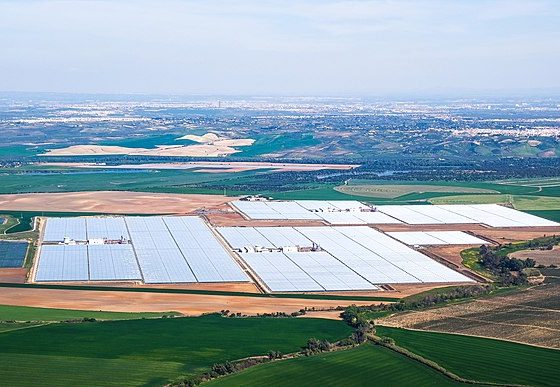A leading green energy trade group whose members include Chinese companies lobbied the White House in a bid to stave off potentially stiffer tariffs targeting Chinese solar companies.
The Solar Energy Industries Association (SEIA) pushed the White House to boost its support for domestic solar manufacturers as part of a gamble to to weaken calls for even more stringent tariffs from American companies, according to Bloomberg News. The efforts attempted to preempt petitions that could lead to new or strengthened protections for the American industry, the outlet reported.
Ultimately, the White House did not substantially bolster support for domestic solar before a coalition of seven American solar firms filed petitions with the Biden administration to investigate “potentially illegal trade practices” by South Asian countries enabling Chinese solar manufacturers to skirt U.S. trade rules. The American solar firms argue these practices harm American industry.
“SEIA has consistently lobbied in favor of policies that benefit Chinese solar companies at the expense of American ones,” Nick Iacovella, senior vice president for public affairs and communications at the Coalition for a Prosperous America, told the Daily Caller News Foundation. “It’s no surprise that once again they would try to undermine a potential investigation into illegal Chinese trade activity that is directly harming U.S. solar manufacturers and American workers.”
A lobbying disclosure report shows that SEIA hired a third-party firm to lobby the White House about “issues related to Solar Investment Tax Credit (ITC) extension and ITC storage and tariffs” during the first quarter of 2024. SEIA declined to confirm or deny that it pushed the White House to expand domestic solar subsidies to dissuade concerned U.S. companies from seeking stronger tariffs.
The petitions themselves do not necessarily guarantee that the government will modify tariffs, but petitions can be the first step toward getting government to investigate alleged abuses of trade law and potentially take action, according to the U.S. International Trade Commission. SEIA has consistently opposed tariffs for the solar market over the past several years.
In August 2023, the Commerce Department concluded that five China-based solar manufacturers had dodged American solar tariffs through Vietnam, Thailand and Cambodia. Members of SEIA — including Canadian Solar and Trina Solar or their subsidiaries — were among the companies trying to evade tariffs that the Commerce Department identified in the 2023 report.
Canadian Solar and Trina Solar are among the world’s ten largest solar companies, as is fellow SEIA member LONGi Solar, according to Renewables Digital. Other Chinese firms or their subsidiaries listed as members of SEIA include Sinotec USA, CATL, Wuxi Suntech and Ginlong Technologies.
China’s dominance of the solar supply chain, access to state subsidies and its labor cost advantage render it difficult for American companies to compete, according to The New York Times.
The petitions filed Wednesday with the Commerce Department hope to force the Biden administration to address allegations that heavily-subsidized Chinese companies are using countries like Vietnam and Cambodia to dodge tariffs and dump their cheaper products into the U.S. market.
Mamun Rashid, CEO of Auxin Solar, said that the Wednesday petitions and stiffer protections are both positive developments for American firms in an interview with the DCNF. Rashid and Auxin Solar filed a trade complaint that spurred the Commerce Department’s 2022 probe into tariff evasion by Chinese solar companies in 2022.
“Unless you close the gate, protect your borders, the imports are going to eat us alive,” Rashid told the DCNF. “SEIA has been vocal about tariffs and against any kind of tariffs … They’ve always said, ‘if you put tariffs, it’s going to decimate the solar industry, it’s going to harm the solar industry.’ Well, tariffs have been put in place before, and it didn’t harm the solar industry at all; in fact, the industry outgrew even the optimistic projections.”
While additional tariffs are likely to hurt Chinese firms, they may also hurt some U.S. companies that rely on Chinese supply chains or products to run their own businesses, according to Rashid. However, reducing opportunities for Chinese firms to dump cheaper products into the U.S. market would be a better outcome for domestic manufacturers than simply expanding subsidies, primarily because “you can never out-subsidize China,” as Rashid put it.
For its part, SEIA claims that the petitions filed Wednesday threaten American companies because they could bring new volatility and disruptions to the industry. A spokesperson for SEIA did not directly engage with questions about its members that are based in China or their subsidiaries.
“We are deeply concerned the [petitions] will lead to further market volatility across the U.S. solar and storage industry and create uncertainty at a time when we need effective solutions that support U.S. solar manufacturers,” SEIA said in a joint statement with the American Clean Power Association and two other green trade groups. “We need constructive actions, like the Advanced Manufacturing Tax Credit and other policies, to expand domestic solar manufacturing and deploy clean energy at scale and speed to serve growing electricity demand.”
Suzi Emmerling, a spokesperson for the American Alliance for Solar Manufacturing Trade Committee, which filed Wednesday’s petitions, agreed with Rashid’s general support of enhancing protection for American firms.
“We strongly disagree that this hurts U.S. firms as much as it hurts Chinese companies,” Emmerling told the DCNF.
The Commerce Department and the White House did not respond to requests for comment.
















